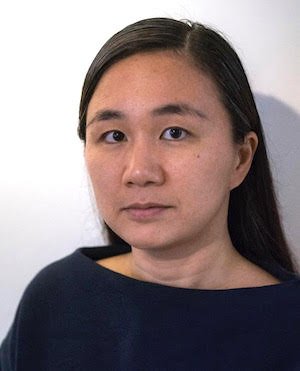 Sachiko Kondo
Sachiko Kondo
Natural Resources Management Specialist
Environment & Natural Resources Global Practice
The World Bank, Washington D.C.
International Development Studies Program (’03)
Please tell us about your career path so far. What is your area of specialization and how did you come to work in this area?
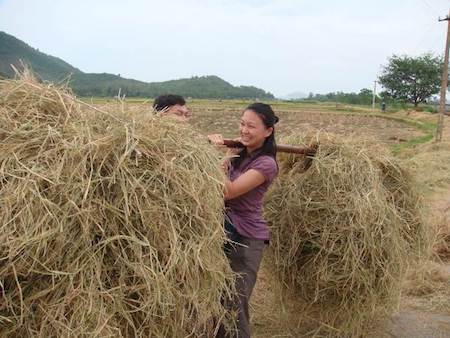
Visiting rural village in Tranh Hoa in Vietnam
Since my childhood I have been interested in working in the food security and poverty alleviation domain, probably because I grew up in South America, in Venezuela and Colombia for five and half years each, and saw poor people around me all the time. Therefore, I chose Agriculture to major in university. I studied International Sustainable Agriculture Development at the University of Tokyo. Initially I was thinking to tackle food security issues through agricultural technologies, but as I studied more, I felt economic dynamics severely affect food issues. I knew Professor Yujiro Hayami from the Development Economics textbook, so I thought a master course in International Development Studies at the National Graduate Institute for Policy Studies (GRIPS) would be a great place to study.
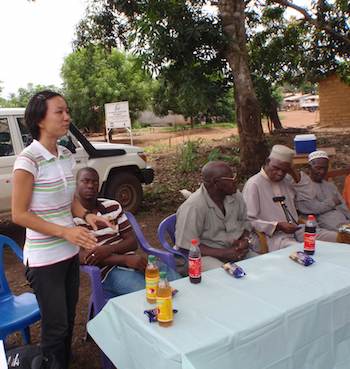
Explaining objective of capacity assessment in Sierra Leone
I was fortunate to have an internship experience at the Food and Agriculture Organization of the United Nations (FAO) at their headquarters in Rome, but I wanted to have more experience in the field, so I started working for a consulting firm when I graduated from GRIPS. Working for a consulting firm was a great experience. I visited a lot of communities in Japan, and learned a lot of their issues and tried to think of solution ideas together. I also worked overseas as a capacity assessment expert in northern Sierra Leone, a community development expert in Bas-Congo province in Democratic Republic of Congo, a livelihoods improvement expert for promoting return and resettlement of Internally Displaced Peoples in Northern Uganda, an agriculture cultivation and livelihoods improvement expert for the Oasis Zones Development Project for Women’s Empowerment in the Islamic Republic of Mauritania, pro-poor small-scale infrastructure development consultant in Vietnam and so on. Then, one day I saw an advertisement for a fishing community development expert to be based in Liberia Country Office for the World Bank. I applied for the post, was hired and I’m still at the Bank now.
You are currently serving as Natural Resource Management Specialist at the World Bank Office in Washington DC. What are your main roles and responsibilities?
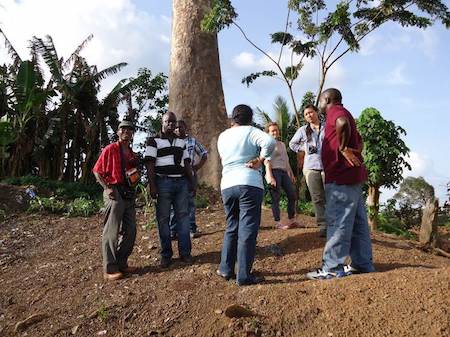
Talking about sacred tree in Liberia
My main roles and responsibilities are supervising and providing implementation support of fisheries projects in Guinea and Mauritania. I’m also supporting other projects as well as being a team member, but Guinea and Mauritania fisheries projects are my primary tasks as a country Task Team Leader. I used to work for the Liberia, Sierra Leone, Ghana fisheries projects, so it is good that I can compare these neighboring countries, trying to share good examples with other countries. It’s interesting to see that each country is so different even though they are neighboring countries.
In your current capacity, what do you see as the main opportunities and challenges for sustainable environment and natural resources management in the mid and longer term?
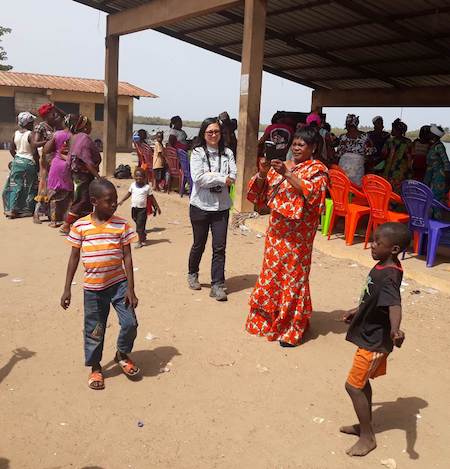
Visiting fishing community in Guinea
The primary challenge is time. It takes time to see the results of sustainable environment and natural resources management, because it takes time for juvenile fish to grow, for a small seedling to be a tree. People tend to take current value of such resources rather than wait to have greater value for the products. People tend to take such resources now before other competitors come and take them. As we learned at GRIPS, there is tragedy of commons. In a sense, I understand this. People need something to depend on right now. People want to take it before others take it, or the resources move. Actually because of climate change and over-fishing, fish habitats have been moving, crossing ocean boarders, and some countries are suffering from less fish catch in traditional years. If this trend continues, there will be no fish in the future. This is very worrisome. This trend could be changed. There is a potential opportunity. More and more consumers want to consume sustainably harvested fish. If such sustainable management is presented and promoted, there are potential markets and a potentially brighter future. It’s hard to do it, because it takes time to see the results, but if some people start then this potential market can be expanded.
What are some of the biggest challenges you face in your work? And what have been the most interesting or rewarding aspects of your career thus far?
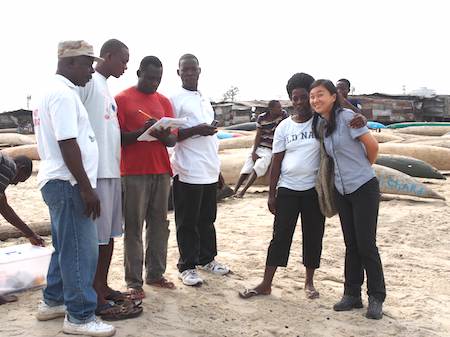
Together with community volunteers who are checking fishing conditions in Liberia
Again it is time, but it is more on a daily basis. It takes time for a small action to take place, so I have to follow up everyday to make things happen. Sometimes today means three days later, tomorrow means weeks later. Sometimes it is because of poor internet connection, bureaucracy, key personnel to be out of a country. I have to call and ask many times in order for one action to take place or to receive one simple report. I also have to triangulate the information by getting the same information from various people. It is not easy doing this everyday, but it is rewarding when I see happy people in communities.
What led you to GRIPS? What is the most important thing you got out of your studies here, and how has your experience at GRIPS prepared you for future endeavours?
I learned a lot at GRIPS, but in retrospect, I think I could have learned more both from academic studies and from networking with people. Great people come to GRIPS and everybody is enthusiastic in learning more to make the world better. Interaction with such great people, great classmates is my greatest asset. I learned a lot from them. I learned a lot from teachers as well.
You have been living outside Japan for a quite a few years now. What do you miss about Japan and what do you like about living in US?
Japanese food. I used to live in Africa and comparing then, I have much better access to Japanese food in the US, but still it is not Japanese food like we get in Japan.
Surprisingly there is a lot of nature in Washington D.C., so it makes me happy. Also I like that all the museums are free in DC. It’s great for children to learn about nature, culture, art, etc.
How do you maintain a balance between your work and the rest of your life? And what is your favorite thing to do when you are not working?
I think I have a relatively good work life balance in DC. There are only four-hours time difference between here and West Africa, so I can communicate with counterparts at regular working hours. The Bank supports staff to have a good work life balance, and I’m fortunate to be surrounded with such managers, supervisors and co-workers.
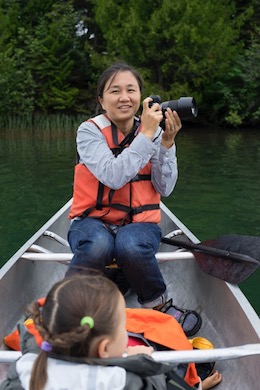
Enjoying nature in a national park in the US
My favorite thing to do when I’m not working is going to see the nature, camping with my family, and swimming in summer time.
What are some of your fondest memories of your time spent at GRIPS? And what do you miss about Japan?
Having a great time with my classmates. Actually I couldn’t stop crying a couple of days before our graduation, so we gathered again and again so as to have more time together with classmates. I wish we could have a reunion, having all the classmates again together.
If you could give one piece of advice to anyone considering studying at GRIPS what would it be?
Talk with people. Talk more with people. More. Those studying at GRIPS are great people. You should share your opinions, receive feedback, discuss your ideas, interact with them. By doing so, you can sharpen your ideas more.
How would you like to maintain involved with the School? What do you expect from GRIPS as an alumnus and do you have any suggestions on how to further utilize the GRIPS alumni network?
It may be interesting to have seminar sessions by GRIPS alumni. With internet, anybody can be connected to make a presentation and to participate in discussion. I receive home coming events or seminar invitations to be held at GRIPS, but I can’t participate in most occasions, because I’m not in Tokyo. If there’s a way to be connected through internet, I’d be happy to participate.





